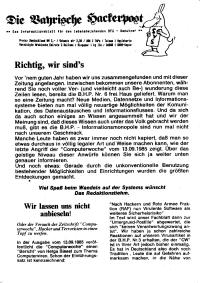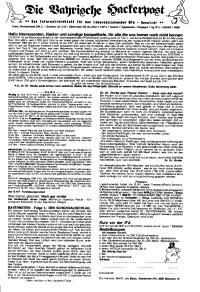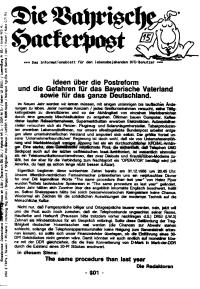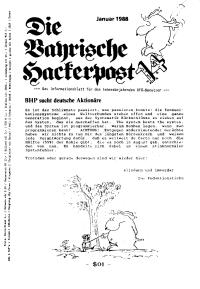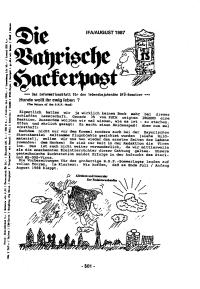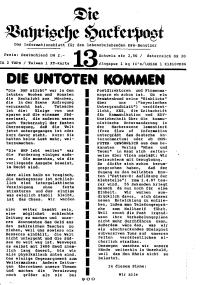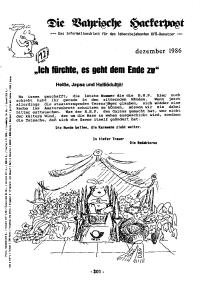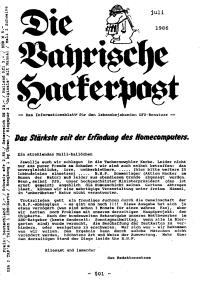Copy Link
Add to Bookmark
Report
Inklings Issue 6.17

****************************************************************
i n k l i n g s
Inkspot's newsletter for Writers on the Net
http://www.inkspot.com
Issue 6.17 August 30, 2000
*****************************************************************
<http://www.inkspot.com/inklings/issues/ink0617.html>
In this issue: Lisa Petsche discusses e-mail etiquette, and Mark
Fowler ("Ask the Lawyer") addresses the question of using real
products and real people in fiction.
This issue sponsored by:
*****************************************************************
XLIBRIS exists to help authors publish. Promptly, permanently.
You retain control. We make it happen: your book in beautiful
hard cover and trade paperback editions, available on-demand,
forever. Call for a free information pack: 1-888-7XLIBRIS, e-mail
info@xlibris.com or visit us online: http://www.xlibris.com/
*****************************************************************
ISSN 1205-6413. Copyright (c) 2000 Inkspot Company Of Canada.
See end of issue for full copyright and contact information.
*****************************************************************
CONTENTS THIS ISSUE:
From the Managing Editor's Desk
Fresh Ink/Book Giveaway
Market Information
Ask the Lawyer
"E-mail and Editors: A Primer," by Lisa Petsche
Inkspot Community Chat Update
Writers' Classifieds
*****************************************************************
FROM THE MANAGING EDITOR'S DESK
-------------------------------
Should You Sell All Rights?
---------------------------
Inklings has a long-standing policy of refusing to list markets
that demand all rights from authors. Lately, this policy has
come under discussion. Some staff feel that publications that
demand all rights constitute a high risk to less experienced (or
less confident) writers, who may believe that they have no choice
but to give up the rights to their work if they want to be
published. Others feel that it would be better to post such
markets, and let writers choose for themselves.
What do you think? Do you feel that there are circumstances
under which you would be willing to give up all rights to your
work? Or do you believe that authors should never, ever sign
such a contract?
In light of the Contentville discussion, this issue becomes even
more important. We'd like to hear your views -- just send an
e-mail to moira@inkspot.com with "Rights" in the subject header,
and we'll give you a report in a few weeks!
Correction
----------
Speaking of Contentville, the previous issue listed incorrect
URLs for the National Writers Union PRC. The correct URLs are:
NWU Seals Landmark Agreement with Brill
http://www.nwu.org/prc/cv1.htm
Information on joining the PRC
http://www.nwu.org/prc/prcjoin.htm
-- Moira Allen
*****************************************************************
Looking for online discussion with other writers? Check out
Inkspot's discussion forum community! Wide range of topics for
writers of all ages.
Forum topics: http://www.inkspot.com/forum/topics.html
Community Events Calendar: http://www.inkspot.com/events
*****************************************************************
FRESH INK
---------
New on Inkspot:
---------------
GLOBAL WRITERS' INK goes online! After a one-year run as an
e-mail newsletter, Global Writers' Ink has moved to the Inkspot
website and is now FREE for all. Stop by for our September launch
to read some great features, including:
Comparing Overseas English-Language Markets, by Jamie McGraw
How to Write Rings Around the World, by Larry Caldwell
Plus, a roundup of international writing contests, conferences,
and tons of links. You'll find everything you need for global
marketing at
http://www.inkspot.com/global/
New to the CHILDREN'S WRITING RESOURCE: A slew of tips and
wisdom from established children's authors at
http://www.inkspot.com/genres/child/tips.html), plus a FAQ
for children's writers compiled by Anne LeMieux, David Lubar
and Marilyn Singer for the AOL children's writers chat
(http://www.inkspot.com/genres/child/faq.html). The Children's
Writing Resource can be found at
http://www.inkspot.com/genres/child
THE TRAVEL WRITER'S SPOT is now featuring an interview with
Madelyn Miller, "The Travel Lady." Madelyn talks about how she
became a food writer and restaurant reviewer, what she has done
to become established, and how the Internet has contributed to
her success. Stop by also for updates on news for travelers
and travel writers, new markets, and loads of resources:
http://www.inkspot.com/genres/travel/
CORPORATE WRITING: GETTING IN THE DOOR
by Peter Bowerman
The author of "The Well-Fed Writer" offers tips on breaking into
corporate writing, including how to find clients, make calls,
and present your credentials.
http://www.inkspot.com/feature/bowerman.html
**-----------------------------------------------------**
Prize Giveaway: Reclaiming the Magic -
A Writer's Guide to Success
---------------------------------------
by Lorna Tedder (Spilled Candy)
Have you spent more time kicking yourself instead of writing? Are
you suffering from burnout, a lack of sales or, worse, lack of
motivation? Never fear, because Lorna Tedder's book, Reclaiming
the Magic, is here! Dubbed by bestselling author Vicki Hinze as
therapy rather than merely a writer's guide, Tedder's book
introduces readers to the seven deadly syndromes that can maim
and eventually kill a writer's spark.
Tedder sets out to deliver a handbook for writers that is teeming
with self-assessments, hints and useful exercises, a book that
helps move writers from the depths of burnout and lack of sales
to renewed motivation and purpose.
To read the review of Reclaiming the Magic and to discover how
you can win a copy, go to the Writer's Challenge board at
INKPRINTS: http://www.inkspot.com/books/inkprints.html
Hurry -- deadline is midnight September 14, 2000!
** If you have a writing-related book you would like to
be considered for review and/or giveaway, please contact Bev at
bev@inkspot.com. The BookStop: http://www.inkspot.com/books/
**-----------------------------------------------------**
How to Get Your Royalties from Contentville.com
-----------------------------------------------
An overview of Contentville's agreement with the National Writers
Union, and tips on supporting your claim of rights and copyright.
http://www.content-exchange.com/cx/html/newsletter/2-5/tt2-5.5.htm
More Advice on Getting Royalties from Contentville.com
------------------------------------------------------
Additional discussion of what rights you can claim, based on the
terms of your contract.
http://www.content-exchange.com/cx/html/newsletter/2-6/tt2-6.htm
Salon.com Table Talk
--------------------
Stop by for a variety of ongoing discussions covering the world
of writing, reading, and many other topics.
http://tabletalk.salon.com
Book Lover Resources
--------------------
A huge selection of links to book-lover and book-industry
sources, including publishers, reviewers, authors, book stores,
scholarly book publishers, and more.
http://www.execpc.com/~mbr/bookwatch/booklove/
Netread: How-to: Book Publishing
--------------------------------
An overview of various aspects of the publishing business,
including printing, e-books, legal issues, distribution,
bookselling, audiobooks, and more.
http://www.NetRead.com/howto/
BookZonePro: Articles about Marketing
-------------------------------------
A host of articles on every aspect of book marketing, including
advertising, promotions, electronic marketing, and trade shows.
Includes sections for beginners and experienced marketers.
http://bookzonepro.com/insights/marketing.html
Help Your Child Learn to Write Well
-----------------------------------
Some useful tips from the U.S. Department of Education on
encouraging writing skills in young folks.
http://www.ed.gov/pubs/parents/Writing/index.html
** Please send suggestions for Fresh Ink to freshink@inkspot.com
*****************************************************************
MARKET INFORMATION
------------------
Please get current, detailed guidelines before submitting to
publications if possible. Don't submit to email addresses unless
specifically stated. Include a SASE for surface mail replies.
More market info at: http://www.inkspot.com/market/.
**-----------------------------------------------------**
"FNASR": First North American Serial Rights, "SASE":
self-addressed, stamped envelope, "simsubs": simultaneous
submissions, "mss": manuscript, "RT": response time, "GL":
guidelines, "cc": contributors' copies.
Markets Editor: Sal Towse (ST). Research assistants: Shane
Stacks (SS), Margaret Shauers (MS), Jan Edwards (JE), Jerri
Ledford (JL).
**-----------------------------------------------------**
9-1-1 MAGAZINE
Editor: Randall D. Larson
P. O. Box 11788, Santa Ana, CA 97211; (714) 544.7776
9-1-1 MAGAZINE is a print magazine for the public safety
communications industry, serving law enforcement, fire,
emergency medical services, and disaster management. FREQ:
Published bimonthly. CIRC: 20,000. NEEDS: 1,000- to 2,500-word
articles accompanied by appropriate high-quality photography.
RTS: FNASR, with a two-year option to purchase second (reprint)
editorial rights at the original payment rate. All subsequent
rights revert to the author. PAYMENT: On publication. 10 cents
per word for feature articles. Departments and columns pay 5
cents per word. $50 for color interior photos, $25 for B/W
interior photos, $300 for cover photo. RT: 1-2 months. SAMPLE
COPIES: Available for $4. Back issues available at same cost.
Archival content available for viewing on the Website. COMMENTS:
We prefer our material written by persons knowledgeable about the
9-1-1 and emergency communications industry. Articles should be
directed at our target audience (9-1-1 communications managers,
fire and police chiefs and supervisors, disaster/Search & Rescue
managers) rather than a general layman's audience. SUBMISSIONS:
Queries preferred, but will look at mss on spec. Mss should
include a 25-word author biography and must include social
security number, address and phone number. If article is
computer-generated, a disk will be requested upon acceptance
(Word, WordPerfect, IBM, MAC or ASCII text file preferred).
Query for electronic submissions via e-mail. Include a SASE if
material is to be returned. ADDITIONAL INFORMATION: Does not
consider simultaneous submissions and rarely accepts a mss or
photograph that has been published elsewhere. Not interested in
fiction or poetry. Upon acceptance of work, authors and
photographers will be asked to certify the material's
exclusivity to 9-1-1 Magazine. Detailed guidelines for editorial
and photographic content are on the website. TIPS: "9-1-1
Magazine is published for a knowledgeable, up-scale audience
actively working in the field. Our primary considerations in
selecting material are: quality, appropriateness of material;
brevity, knowledge of our readership; accuracy; accompanying
photography; originality, wit and humor; a clear direction and
vision; and proper use of the language." (JE)
URL: http://www.9-1-1magazine.com/
GL (editorial)
http://www.9-1-1magazine.com/info/resources/edGuides.html
GL (photography)
http://www.9-1-1magazine.com/info/resources/phoGuides.html
E-mail: magazn911@aol.com
WOULD THAT IT WERE
------------------
Editor: Don Muchow
WOULD THAT IT WERE is an online magazine. FREQ: Quarterly. NEEDS:
Science Fiction stories set in the period of 1830-1930, "in the
tradition of H. G. Wells and Jules Verne". LENGTH: This market
accepts Flash fiction (under 500 wds), short-shorts (501-3,000
wds), short stories (3,100-5,000 wds), and occasionally
lengthier fiction by arrangement. GL: "Submissions must be
received in MSWord, RTF or HTML format by e-mail, rendered in
12 pt. Courier or Courier New with 1-inch margins and free of
extraneous formatting and typefaces. Hard copy is not acceptable
and will not be returned." Multisubs, simsubs, and previously
published material all accepted (compensation, etc. negotiated
case-by-case). RIGHTS: FNASR. PAYS: Flash Fiction $0.05-$0.10/wd
up to $50; Short-shorts $0.03-$0.05/wd up to $150; Short
stories $0.03-$0.05/wd up to $250; Longer submissions: Maximum
$0.03/wd or by special arrangement. Pays on publication. RT:
2-3 days. TIPS: "Your CV/biographical information is as important
as your story. Please remember to send a brief description of
yourself, your writing and anything that would draw attention to
your work." ALSO: "Regarding format -- submissions must be free
of pervasive grammatical, spelling and punctuation errors and
not designed to look best in any specific font (we reformat
submissions to suit our display format)." (SS)
URL: http://www.wouldthatitwere.com/
GL: http://www.wouldthatitwere.com/guidelines.html
E-mail: editor@wouldthatitwere.com
**-----------------------------------------------------**
American Women Road and Travel
Editor: Courtney Caldwell
2424 Coolidge Rd., Suite 203, Troy, MI 48084
AMERICAN WOMEN ROAD AND TRAVEL "is a national consumer lifestyle
magazine and website specializing in automotive and travel topics
for working and family women of all ages and descriptions. These
women purchase more than 50% of all new vehicles, 48% of all used
vehicles and influence 80% of all sales. New car annual sales are
currently at $83 billion and growing. CIRC: Stats on new website
are not finalized yet. NEEDS: Gender-neutral (appealing to both
men and women) articles on such things as purchasing, leasing,
renting, repairs and maintenance as well as travel and personal
road safety topics, including articles on travel safety,
personality profiles, humor, views on women adventurers with an
unusual slant making them valuable and interesting, and buyer's
guides. LENGTH: Features approximately 1,500 words, columns
approximately 500 words. GL: Writers are contacted upon
acceptance only. Submissions that do not fit our format will be
returned only upon request with a SASE. Submissions should be
typed using a 55-character width, double-spaced. They should be
submitted via e-mail to courtney@awroadandtravel.com or on a
disk saved as a TEXT ONLY file. If AWRT is required to type in
the article, payment is reduced considerably. PAYMENT: Payment
fluctuates between byline-only to $250 depending on quality, not
length. Special features will be negotiated with the publisher.
As a monthly magazine and website, AWRT accepts approximately 200
freelance manuscripts per year for review. Payment is always 30
days after publication, with an average 3-month holding period.
Payment is killed for unused, unsolicited stories. A kill fee
will apply to solicited stories. Rights are "open for
negotiation. We're still small and are willing to work with
writers. RT: "If we don't use an article, it is returned within
a month as long as a SASE is enclosed. We still prefer snail mail
submissions for now." TIPS: Read the magazine, and "see writer's
guidelines for specific suggestions to follow before submitting
your manuscript." (JL)
URL: http://www.awroadandtravel.com
GL: http://www.awroadandtravel.com/company/writerguide.html
E-mail: courtney@awroadandtravel.com
**-----------------------------------------------------**
CHATELAINE
Editor: Rona Maynard; Online Editor: Pamela Chan
Editorial Department, 777 Bay Street, Toronto, Ontario, Canada
M5W 1A7; Phone: (416) 596-5425; Fax: (416) 596-5516
CHATELAINE is a magazine for all aspects of a Canadian woman's
life -- reports on national issues and trends, health, careers,
personal finance, fashion, lifestyles and relationships. FREQ:
Monthly. CIRC: 800,000. NEEDS: Feature articles and articles for
the Health pages. LENGTH: 500-3,000 words. RT: First time print
publication (French and English), plus the nonexclusive right to
archive and distribute electronically, and to republish work in
an online site. Contractual agreement required. Subsidiary rights
are retained by author. Reprint requests are passed on to authors.
Authors are also given the option of offering their work for
resale to other publications through a U.K. syndication agency.
PAYMENT: On acceptance of final mss. Fees start at $500 for a one-
page article. RT: Up to six weeks for query letters. SAMPLE
COPIES: Available for CDN $3.50 plus postage. Some content
available on website. COMMENTS: See "Feature Articles - A
writer's guide" on website. SUBMISSIONS: Written proposals for
possible freelance assignments are essential and should summarize
as briefly as possible the story idea, its timeliness and
relevance to Chatelaine readers, angle, potential sources and
length. If you haven't written for Chatelaine previously, please
include samples of work and/or a resume. SASE required for
response. (JE)
URL: http://www.chatelaine.com
GL: http://www.chatelaine.com/faq/guidelines.html
**-----------------------------------------------------**
12TH PLANET
-----------
Editor: Rachel Baron
4111 Circle Court, Suite 1, Williamsville, NY 14221
12TH PLANET is an online literary magazine. FREQ: Quarterly.
NEEDS: "Poetry that uses imagery to communicate, not just big
words." GL: Send up to three poems at a time, either via e-mail
or postal mail. For e-mail, submissions should pasted into the
body of the e-mail (attachments are not accepted). For postal,
follow standard submission guidelines. Simsubs and previously
published material both considered. RIGHTS: One-time electronic,
for a period of three months. "Will happily allow published pieces
to remain on author's website if a link is provided." PAYS:
$5/piece. Pays on publication. RT: One month. TIPS: "We shy away
from rhyming poetry, unless the work is exceptionally lyrical in
quality. It should sound pleasant to the ears, as well as the
mind. Use powerful images that are universal, simple on the
surface, yet layered with meaning... We will read up to three
poems submitted at one time. Subsequent poems are unread. Authors
can submit more pieces immediately after we respond to initial
submission. Simsubs are OK, and we will consider previously
published work. However, we do not like to see three poems
submitted at one time that have been published elsewhere. Send
us something fresh!"
URL: http://home.att.net/~baronr/
GL: http://home.att.net/~baronr/guidelines.htm
E-mail: twelfthplanet@worldnet.att.net
Please send market news to Sal Towse, towse@inkspot.com.
*****************************************************************
Ask the Experts
---------------
*** Please put "inklings question" in the subject header. ***
Judith Bowen (ROMANCE WRITER) judith@judithbowen.com
David Breeden (POET) dbreeden@schreiner.edu
Tracy Cooper-Posey (E-WRITER) tracy@sashaproductions.com
Charles Deemer (SCREENWRITER) charlesd@inkspot.com
Mark Fowler (LAWYER) askthelaywer@inkspot.com
Ginger Knowlton (AGENT) agent@inkspot.com
Michelle West (SF/FANTASY WRITER) Michelle.Sagara@sff.net
Lee Wardlaw (CHILDREN'S BOOK WRITER) lee@inkspot.com
Marcia Yudkin (FREELANCE WRITER) yudkin@inkspot.com
Columnists may be unable to reply privately to every message,
but will answer selected questions in future issues of Inklings.
Please keep your question BRIEF and send it to *one* columnist.
*****************************************************************
ASK THE LAWYER
-----------------------------------------------------------------
by Mark Fowler <askthelawyer@inkspot.com>
Using Names, Tradenames, and "Real People" in Fiction
-----------------------------------------------------
Q. I've always understood that if you use a brand name, such as
"Kleenex," you must write it as "Kleenex brand tissue". However,
I see many famous novels that mention products by their commonly
used names, e.g., "He gulped a Sprite" or "He looked at his
Rolex." What is legally correct?
A. Trademark lawyers will volunteer to dance at your wedding if
you consistently use the phrasing "Thermos® brand vacuum bottles"
and "Xerox® brand photocopying machines." That awkward
formulation is not, however, a legal requirement. That said,
trademark owners and their attorneys are rightfully concerned
about their famous marks becoming "generic" -- that is, through
common usage in speech, gradually becoming the everyday term for
the product or service to which the mark is applied. Many now-
generic terms, such as "aspirin" and "escalator," were once
famous trademarks that lost their distinctiveness and therefore
their trademark protection. Consequently, any pharmaceutical
manufacture may now refer to its analgesic as aspirin. As a
writer, you will likely avoid any complaints if you simply pay
your respects to the trademark owner by capitalizing the brand
name of the product ("he drank a Coke," not a "coke") and by not
transforming trademarks into verbs ("she photocopied the page,"
not "she xeroxed the page"). In commercial settings, such as
writing advertising copy, it may be prudent to include the ®, TM,
or SM symbol to identify trademarks and service marks.
Q. What are the laws regarding using a famous, living person as a
character in a work of fiction?
A. This simple question has a surprisingly complex answer. As
readers of Gore Vidal and E.L Doctorow are well aware, there is a
long tradition of depicting deceased historical figures in works
of fiction. Yet using living people -- and perhaps even the
recently dead -- in fiction can sometimes give rise to legal
disputes.
First, there is the issue of whether you can simply use an
individual's name in a fictional work without his permission. In
the 1998 case of Polydoros v. Twentieth Century Fox Film Corp.,
the plaintiff, a former high-school classmate of filmmaker David
Mickey Evans, sued because Evans had included in his movie The
Sandlot a character named "Michael Palledorous." The California
court ruled that the mere conjuring up of an old friend's name in
a work of fiction did not, by itself, violate the law that
prohibits the use of an individual's name, without permission,
for "commercial purposes."
But what if you go one step further and depict a real person
actively engaging in unreal events? Almost immediately, you may
confront potential issues of defamation or "false light" invasion
of privacy. ("False light" involves a false depiction of an
individual that is highly offensive, but not necessarily
defamatory.) In one venerable New York case, for example, the
baseball pitcher Warren Spahn successfully argued that his rights
had been violated when a fictionalized "biography" depicted him
in heroic situations that never occurred. It is questionable
whether the Spahn case is still good law. Nevertheless, in a
controversial (and I believe wrongly decided) case in 1987,
another New York court held that it was potentially actionable to
use the name of an Archbishop, who had been prominent in the
collapse of the Vatican Bank, in the context of an entirely
fictional novel about a conspiracy to assassinate the Soviet
Premier. The book contained an explicit disclaimer of any
connection to real events or real people. Nevertheless, the
court was troubled by the fact that the Archbishop's name was
used only to give a "sense of historical accuracy" and noted
that, in the British edition, the publisher had decided to give
the character a different name. The parties settled before there
was a final decision on the legal issue.
Because the law in this area is unclear, when the magical novel
Shoeless Joe, by W.P. Kinsella, was made into the movie Field
of Dreams, the lawyers changed the name of an important character
from "J.D. Salinger" -- modeled after the reclusive and litigious
real-life author -- to "Terence Mann" in order to avoid a lawsuit.
(Movie studios are generally more cautious on these matters than
are book publishers.)
Despite a few disturbing precedents, there are strong First
Amendment arguments that writers can include real people in
fictional works without incurring liability (as long as the
depiction is not defamatory or an invasion of privacy). Many
writers have done so without encountering any legal problems.
But exercise care. At the outset of a "faction" project, it is
wise to speak to your publisher or attorney for detailed advice
on how to insert real people into fictional works with minimal
risk.
**-----------------------------------------------------**
This column is by Mark A. Fowler of Satterlee Stephens Burke &
Burke LLP (http://www.ssbb.com).
PLEASE NOTE: This column is intended solely to provide general
information about matters of concern to writers, not specific
legal services or advice. On some issues, there are significant
differences between the laws of the United States and the laws of
Canada (and significant variations from state to state or from
province to province.) If legal assistance is required, the
reader should consult an experienced attorney who can review and
assess all of the facts and circumstances relevant to the
reader's situation.
Copyright (c) 2000 Mark Fowler
*****************************************************************
E-MAIL AND EDITORS: A PRIMER
-----------------------------------------------------------------
by Lisa M. Petsche <lpetsche@idirect.ca>
E-mail is a wonderful time- and money-saving tool for writers.
With it you can request writer's guidelines, send queries, submit
manuscripts, follow up on queries and submissions, and send
invoices.
Editors vary, however, in their receptivity to e-mail
communication. Some accept e-queries and e-manuscripts, while
others do not. Some may accept manuscripts electronically, but
only when they have been solicited. Still others don't accept
e-mail submissions from unknown writers, but once you have a
relationship with them (i.e., have had an article accepted) you
may be invited to submit electronically. On the other hand, many
editors of e-zines and Web publications will accept queries and
manuscripts only by e-mail.
Finding Writer's Guidelines
---------------------------
To determine what is acceptable to a particular publication's
editors, obtain and read the writer's guidelines, which usually
indicate acceptable modes of submission. There are numerous
online writer's guidelines databases where you can search for the
publication you wish to target; see the Resource section, below,
for a complete list.
Small publications -- especially regional ones -- may not be
included in even the largest database, however. In that case, use
a search engine to try to find a Web presence for the publication.
If you are able to locate a Web site, look for writer's
guidelines that you can print for future reference. (Check the
site map if you don't see a "Submissions" or "Guidelines" heading
on the main menu.)
If you can't find guidelines, look for a "Contact Us" or
"Feedback" link. Use it to e-mail the editorial staff to inquire
about availability of writers' guidelines and how to obtain them.
Often they can be sent by e-mail. Include your full name and
snail mail address, though, in case they must be mailed to you.
(Occasionally you may be instructed to request guidelines by mail
with a SASE.)
If you can't locate an editorial e-mail link, contact the
webmaster instead (the link is usually located at the bottom of
the page). Ask how to contact editorial staff by e-mail.
When writer's guidelines include an e-mail address but don't
indicate whether electronic queries and submissions are welcome,
send a short e-mail to inquire. Do not submit anything
electronically -- particularly an unsolicited manuscript --
unless you know it is welcome.
Projecting a Professional E-image
---------------------------------
Most people know the basics of e-mail etiquette, such as "keep it
short" and "don't type in capital letters.'" But there are many
other informal do's and don'ts of electronic communication that
are worth mentioning. Following them will enhance your image as a
professional writer.
Do:
-- make your subject line descriptive to catch the editor's
attention and encourage immediate reading.
-- keep initial contacts formal and let the editor set the tone
for future communication.
-- use bullets or numbered points if you're including a list of
items.
-- write messages that are easy to respond to. If action is
required, put it in the subject line, e.g. "Need reply by..."
-- take advantage of the spell check feature.
-- be judicious about using the "high importance" notation. If
your message is truly urgent, consider using the telephone.
-- check your e-mail frequently for new messages -- especially on
weekdays. It's worth checking on evenings and weekends too, since
an increasing number of editors work from home and have flexible
schedules.
Don't:
-- use a background color that is very bright or very dark. The
standard white with black lettering works best.
-- bother an editor with frivolous inquiries or premature
follow-ups just because it is quick and easy to dash off e-mail
messages. Remember, an editor receives dozens if not hundreds of
electronic messages per day and won't appreciate unnecessary
communication.
-- send attachments unless invited to do so (either through
writer's guidelines or personally by the editor). Then, be sure
to send the type of file requested (e.g., text file, Word 97,
etc.). If an editor indicates that attachments are acceptable but
doesn't specify a format, ask first. Otherwise, paste your
manuscript into the body of your e-mail message, below your
cover letter or introduction. (Be sure to use plain or ASCII
text and remove all formatting and special characters, such as
"smart quotes".)
-- request a receipt unless it's really necessary. Editors may be
insulted by the implication that they don't read their mail regularly.
Using e-mail to query and submit material can greatly speed up
the process of getting your work accepted -- but only if your
e-mail presents a courteous, professional image both of your work
and of you, the writer.
RESOURCES:
----------
Writer's Digest -
http://www.writersdigest.com/guidelines/index.htm
Contains more than 1,300 guidelines, supplied by book and
magazine editors. Search by selecting a category or typing a
word or phrase.
Writer's Guideline Database - http://mav.net/guidelines
More than 500 nonfiction guidelines.
The Writing Place - http://www.awoc.com/Guidelines.cfm
Lists 650 paying markets. Search by all or part of the market
name or by subject.
WritersWeekly.com -
http://www.writersweekly.com/payingmarkets.htm
Lists only paying markets and indicates current needs, based
on editor interviews.
**-----------------------------------------------------**
BIO: Lisa M. Petsche is a Canadian freelance writer whose
publication credits include: Canadian Living, Today's Parent,
Big Apple Parent, Our Family, Forever Young, The Dollar
Stretcher, The Cottage Magazine and The Hamilton Spectator. This
article originally appeared in the Canadian writers' publication
FellowScript.
Copyright (c) 2000 Lisa Petsche
*****************************************************************
INKSPOT WRITERS' CHAT CENTER UPDATE - by Shane Stacks
-----------------------------------------------------
Coordination is currently underway for September's chat... more
details next issue!
MARYJANICE DAVIDSON's August 17th "Escape the Slush Pile" chat
was superb, and so many people showed up we'll probably have her
back in the future to get to all the fantastic questions she
didn't get a chance to answer. For those who missed it, a
transcript is available at
http://www.inkspot.com/ss/iwcc/transcripts.html
ALSO: All the guest speaker volunteers from a few weeks back
should have heard from me by now. If you haven't, please e-mail
me so I can get things cleared up. Thanks to everyone for
offering their time, we had a *huge* response to our call.
INKSPOT CHAT MAILING LIST: Send blank e-mail to
icc-subscribe@topica.com
DISCUSSION FORUMS: Join this growing community of writers!
Wide variety of topics and events, everyone welcome.
http://www.inkspot.com/forums/topics.html
FOR MORE INFORMATION:
Inkspot Java Chat: http://www.inkspot.com/ss/iwcc
(open 24/7, chat anytime!)
Community Events Newsletter:
http://www.inkspot.com/events/
Or send e-mail to Shane Stacks at staxx@inkspot.com
*****************************************************************
W R I T E R S ' C L A S S I F I E D S
----------------------------------------------------------------
Ready to improve your skills? Writers University can help. We
have classes covering many topics including screenplays, novels,
marketing, developing characters, and more. All classes are
offered online and are affordably priced. Visit our website for
more information: http://writersbbs.com/wu/
*****************************************************************
** How to advertise in Inkspot or Inklings **
*****************************************************************
For details, e-mail autoresponder ratecard@inkspot.com or see:
http://www.inkspot.com/admin/ratecard.html
*****************************************************************
INKLINGS NEWSLETTER STAFF
(for full Inkspot staff list, please see
http://www.inkspot.com/admin/staff.html)
Editor-in-Chief: DEBBIE RIDPATH OHI <ohi@inkspot.com>
Managing Editor: MOIRA ALLEN <moira@inkspot.com>
Markets Editor: SAL TOWSE <towse@inkspot.com>
Inklings columnists: See "Ask The Experts" section
Market researchers: See Markets section
Circulation Manager: FOX <fox@inkspot.com>
Assistant Editor: SHANE STACKS <staxx@inkspot.com>
Editorial Assistant: TRACY COOPER-POSEY <tracy@inkspot.com>
Copy Editor/Proofreaders: GAIL HEINSOHN<intrepidrider@taconic.net>
YSABEL DE LA ROSA <ysabel@facilnet.es>
Systems Administrator: BRYAN FULLERTON <bryanf@samurai.com>
*****************************************************************
Thanks to Samurai Consulting for hosting the Inklings mailing
list. More info: http://www.samurai.com or bryanf@samurai.com
*****************************************************************
Subscribers are welcome to recirculate Inklings for nonprofit use
as long as the ENTIRE text of the newsletter is included and
appropriate credit is given. For reprint information, contact
moira@inkspot.com. All articles copyrighted by their authors.
Back issues/info available at: http://www.inkspot.com/inklings/
Autoresponder info
------------------
info@inkspot.com - Info about Inkspot and Inklings
adminfaq@inkspot.com - How to subscribe, unsubscribe, etc.
guidelines@inkspot.com - Writers' guidelines, payment info.
concerns@inkspot.com - To report errors, concerns, etc.
about Inklings or Inkspot articles
Inkspot Company of Canada, 67 Mowat Ave., Suite 239, Toronto,
ON Canada M6K 3E3. http://www.inkspot.com
*****************************************************************
To unsubscribe from Inklings, e-mail majordomo@samurai.com with
"unsubscribe inklings <your email address>" in the message body.









